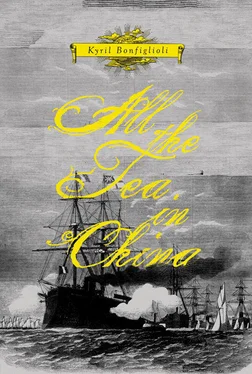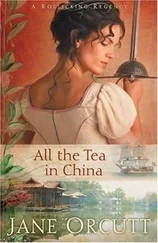There was, in truth, little else to keep my mental faculties awake: one day of scudding through a tropical sea is much like another; one balmy, breathless tropic eve, spangled with improbably large stars, is hard to distinguish from its fellows and one hot, tossing, sleepless night spent lusting after a woman who is in bed with a Sea-Captain a few yards above one’s head is only a little more hellish than the last. Having exhausted the tepid pleasures of “Jane Austen” and vainly attempted to woo sleep with the incomprehensible logic of Norie’s Seamanship , I was at last forced to borrow a tattered copy of the Bible from the fo’c’sle.
I learned to love this book. There is no finer compendium of factual and fictional lore to be had, with the possible exception of Captain Burton’s translation of the Arabian Nights , which is unexpurgated. I took care to eschew the more inflammatory passages, such as the Song of Solomon and certain parts of Ezekiel, but my state was such that even when trying to drug myself with the lists of the ancestors of Abraham, I found myself not so much marvelling that Nahor begat Terah but wishing that I could be relishing the begetting-act myself. Such is the magic of the written word.
Our course often took us within sight of shore but this was rarely more than a smudge on the horizon to port, although sometimes we could glimpse white, sandy beaches and palm-trees. Once, when we were in shoaling water and about to change course to starboard, the look-out bellowed “Shipwrecked mariner clinging to wreckage, five cables distant, fine on the starboard bow!” The Captain used his telescope and held course until we came up with the wretched fellow, then had the yards backed and hove-to. This surprised me for by then it was evident that the mariner was by no means shipwrecked, but the master of the most primitive craft you can imagine: he was seated astride a log, half awash, which was attached to a smaller log by means of a sort of basket-work structure which supported a large stone and a length of line.
“A pearl-fisher, Mr Van Cleef,” said the Second curtly, in answer to my question. “Ancient, pre-Dravidian race; ugly. The stone gets him down to the oyster-beds, d’ye see. Bad life. Never make old bones.” The fellow was by now swarming up a rope which had been tossed to him and soon stood on our deck in a puddle of water. He was, indeed, notably ugly and of a deep, blue-black hue. His features could only have been acceptable to others of his race. He was entirely naked and, after one glance (which lasted quite five seconds) Blanche fled modestly from the scene. His male member was pitifully small, resembling nothing so much as a wrinkled hazel-nut but this, I supposed, was due to long immersion in the water. He wrung out his long hair onto the deck but this elicited no more than a low growling sound from Captain Knatchbull who, clearly, was determined to show the man civility.
“Greet him,” he growled to the comprador , who addressed a few words of some lingua franca to the fisherman, with an air of great disdain such as you might see in the demeanour of an English parlourmaid bidden to do some task which was “not her work”. The black man’s face burst open into an enormous smile, made the more interesting by the lack of his front teeth and the fact that the remaining ones were of a rich scarlet colour.
He rattled off some words in what must have been a language because the comprador made shift to understand them. A pannikin of fresh water was brought and the man drank it off with every sign of relish.
“No fresh water on this coast,” vouchsafed the Second. “They have to catch the dew.”
After more exchanges the man reached behind him and began to explore the terminus of his digestive tract, bestowing on us all the while that nightmare smile. One of the Captain’s Chinese boys fetched a bucket of sea-water, into which the fisherman dropped the fruits of his rummaging. After rinsing, the nasty nuggets proved to be three pearls. I knew little of such things at the time, but still, perhaps, more than most Gentiles. One was a very fine rose-coloured stone, one a large one but of bad colour and the third smaller but of a most perfect roundness and luminosity. The Captain proffered a half-guinea, somewhat worn and bent. The pearl-fisher gazed at it, horror-stricken, then threw himself upon the deck, patting the Captain’s boots and shrieking in a dignified fashion.
“Well?” asked the Captain of the comprador.
“He says, Sir, you are his father and mother and he is your dog.” The Captain brushed aside the interesting suggestions, ignoring their implications.
“What does he want?”
“He says, Sir, that he wants two whole guineas and a piece of cloth. Thick guineas, he says and new cloth.”
After more shrieking and growling a deal was struck: the blackamoor took two half-guineas, one of them thick, a sprinkle of small silver coins and a short yard of red flannel from the slop-chest. He also begged a wisp of cotton, in which he wrapped his bullion before committing it to the vault where he had kept the pearls. As soon as he was over side the Captain called all officers to the break of the poop. There was a custom in these affairs, it seems.
“Order of seniority,” rasped the Captain. “I claim the pink pearl at half a guinea.” He aimed his eyebrows at us. No one demurred.
Lubbock had next pick. He was, as I have told you, not clever and he claimed the large, ill-coloured stone at the cost of a guinea and a crown. The Second, with a gloomy air which, I fancy, concealed a certain pleasure, pouched the smaller, beautiful pearl for an outlay of half a guinea. The money was then ritually divided between the three, after deducting the initial outlay: each received six shillings and eightpence. It was a glum Carolus Van Cleef who sulked in his cabin that afternoon.
We took in sail and cruised slowly up that coast, taking soundings, for the rest of the day. Sure enough, just before evening another log-borne fisherman was sighted and taken aboard. He had four pearls. “Our turn this time, Karli,” murmured Peter.
The Captain claimed the finest for a half guinea again but then it was “reverse order of seniority” which meant that I had first choice. To everyone’s amusement I selected a large, misshapen pearl of varied colour and secured it for three half-crowns. Such “baroque” pearls are despised in England but I knew how much they were prized by jewellers in Augsburg and Amsterdam. (If ever you are privileged to call on my young friend Ferdinand de Rothschild at Waddesdon, his château, you will be shown wonderful examples, wonderful.) The remaining two might have been brothers, they were not large but perfectly matched. It was conceded that they might be considered a single lot and Peter gave two pounds. Dear fellow, he thought that I had stood back from them out of courtesy to him.
I supped heartily that night and with great contentment. I washed my pearl again, for I am a fastidious man, and admired it for an hour, while Orace sewed me a little bag made out of the tail of my silk shirt so that I could hang it about my neck. Pearls are happiest when close to the warmth and natural grease of the human skin, everyone knows that.
We reached the end of the pearling-coast and clapped on sail again until there came a day when we found ourselves at the Mouths of the Ganges and hove-to at the entrance to the Hooghly River awaiting a pilot, while our Captain paced up and down, munching his beard impatiently. Even he, let alone anyone in his senses, would not try to navigate the Hooghly unassisted, for the whole stretch of it is a treacherous maze of mud-and sand-banks, forever shifting. The pilot-cutter came dancing out to us the next morning and a little tea-coloured man skipped aboard, nodding and becking daintily but with a curious dignity, and introducing himself as “Mister Pilot D’Souza”.
Читать дальше












